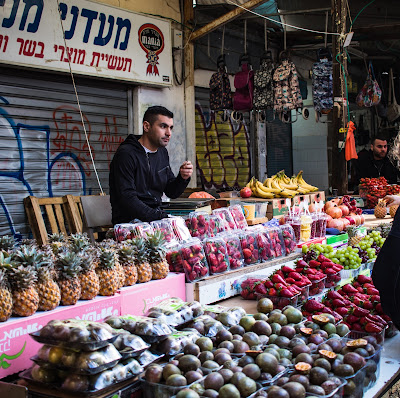by Rav Netanel Yosifun, yeshiva.co, translated by Hillel Fendel
In honor of both this week's Torah portion recounting the falling of the Manna from Heaven, and Tu B'Shvat
In his biographical work on Rav Yaakov Moshe Charlop, his great-grandson Yair Charlop, a resident of Beit El, brings the following wondrous story.
Rav Charlop was known to be a prodigious, top student of the famed Rav Kook in Jerusalem, an expert in Halakhah, Aggadah, and Kabbalah. One of his works is entitled Lechem Abirim, which means Bread of Angels. In his introduction he mysteriously wrote, "I gave this name to the book, for reasons concealed with me."
Author Yair has an educated guess as to what one of these "concealed reasons" might have been, and it is connected with the Manna of this week's Torah portion. The words lechem abirim appear in Psalms 78, which states, "He rained down Manna upon them to east… [and] man ate the bread of angels…" The Talmud (Yoma 75) states that one of the reasons the Manna is called "bread of angels" is because the angels eat of it.
Yair tells the story of his great-aunt, Rav Charlop's youngest daughter Chava Dina Be'eri-Shlesinger, who was a little girl when it happened. A few of her father's Kabbalah students came to the house one evening, looking very excited, and asked to speak urgently with the Rav. They even asked that everyone leave the room for the occasion, although they allowed little Chava Dina to remain, thinking she would not understand. The door was locked, and one of the students quoted a Kabbalah text to the effect that unique worthy individuals can find some Manna, and if they merit to eat of it, they will be granted exalted, profound Torah insights. The discovery of the Manna will also allude to the approaching complete Redemption.
The students said they had gone to the Sinai Desert to look for Manna – and in fact, after many deep prayers and searches, they found some, in a hidden cleft of a rock. They immediately rushed with it to their Rav to tell him of their amazing find.
Rav Charlop was, as expected, very excited and moved at the news, and asked to see the Manna. The students produced a small jar containing something white that looked like food. They divided it up among them, and each of them made a blessing. [Chava Dina didn't remember which blessing it was precisely, but the Kabbalist-Halakhist Rama of Pano (16th century, Italy) wrote that when we eat Manna in the future, the blessing will be, "Blessed… Who extracts bread from the heavens."]
It could be, therefore, that the upper secrets that Rav Charlop wrote in Lechem Abirim were revealed to him after eating this Manna. This would explain why he gave this title to the book. And this also connects with what we know that the secrets of Torah contribute to the arrival of the Redemption, because they are a taste of the Torah of Mashiach. The Midrash Mechilta in fact says that in the future, we will merit to eat of the Manna.
And truly, just as we see now, in this generation nearing Redemption, that the public at large is being increasingly exposed to the secrets of Torah in simple language, so too can we, in all humility, partake in something akin to the Manna. Thus we will merit to prepare our bodies to absorb the great revelation of the Redemption. How so?
The Chessed L'Avraham asks: How is it that the Land of Israel "lost out," so to speak, in that as soon as Israel crossed over into it, the supply of heavenly Manna and its spiritual heights abruptly stopped? He gives the following fascinating answer: Once we entered Eretz Yisrael, there was no more need for the Manna's spiritual virtues! The sanctity stored up in the Manna is readily available in the holy fruits of the Land!
Outside the Land, we do not have a direct connection with G-d, but only via the "ministers" – the goyim's spiritual powers. Therefore, the fruits growing abroad are similarly materialistic and physical. But the fruits of Eretz Yisrael are spiritually-charged. When we were in the desert for 40 years, we couldn't eat the physical fruits from outside the Land, and so we had to eat of the Manna, the special heavenly spiritual food. But once we entered the Land, we were privileged to be nourished from the abundance of life directly from G-d, thus that the fruits of this special Land are sacred and able to serve us as physical and spiritual food simultaneously.
And in fact, the holy Arizal and his students, who brought the Kabbalah and its Torah secrets into the world, are also those who instituted the practice of eating fruits of the Holy Land on Tu B'shvat, which we will commemorate a few days from now – for these issues are bound up with each other. During the Exile, fruits of the Land were hard to come by, and the Jews were forced to suffice with fruits from abroad while pining for the fruits of Eretz Yisrael. But we have now merited, thank G-d, to be able to partake of fruits of Israel, and be satiated with their holiness.
Let us strive on this Tu B'Shvat, and all year round, to eat of the fruits of our holy land, and in this merit, we will merit the coming of the Redemption, speedily in our days!

No comments:
Post a Comment